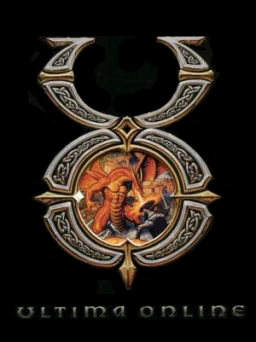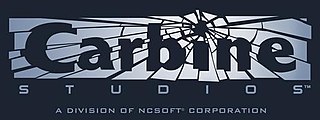Related Research Articles
A massively multiplayer online role-playing game (MMORPG) is a video game that combines aspects of a role-playing video game and a massively multiplayer online game.

Ultima Online (UO) is a fantasy massively multiplayer online role-playing game (MMORPG) released on September 24, 1997 by Origin Systems.

Richard Allen Garriott de Cayeux is a British-born American video game developer, entrepreneur and space tourist.

Origin Systems, Inc. was an American video game developer based in Austin, Texas. It was founded on March 3, 1983, by Richard Garriott and his brother Robert. Origin is best known for their groundbreaking work in multiple genres of video games, such as the Ultima and Wing Commander series. The company was purchased by Electronic Arts in 1992.

Lineage is a medieval fantasy, massively multiplayer online role-playing game (MMORPG) released in Korea and the United States in 1998 by the South Korean computer game developer NCSoft, based on a Korean comic book series of the same name. It is the first game in the Lineage series. It is most popular in Korea and is available in Chinese, Japanese, and English. The game was designed by Jake Song, who had previously designed Nexus: The Kingdom of the Winds, another MMORPG.

Destination Games was an American computer game development company created in April 2000 by Richard Garriott, Robert Garriott and Starr Long, following their departure from Origin Systems.
A massively multiplayer online game is an online video game with a large number of players on the same server. MMOs usually feature a huge, persistent open world, although there are games that differ. These games can be found for most network-capable platforms, including the personal computer, video game console, or smartphones and other mobile devices.

NCSoft Corporation is a South Korean video game developer and publisher headquartered in Pangyo, Seongnam, South Korea, primarily known for the distribution of massively multiplayer online role-playing games such as Lineage and Guild Wars.
Player versus player (PvP) is a type of multiplayer interactive conflict within a game between human players. This is often compared to player versus environment (PvE), in which the game itself controls its players' opponents. The terms are most often used in games where both activities exist, particularly MMORPGs, MUDs, and other role-playing video games, to distinguish between gamemodes. PvP can be broadly used to describe any game, or aspect of a game, where players compete against each other. PvP is often controversial when used in role-playing games. In most cases, there are vast differences in abilities between players. PvP can even encourage experienced players to immediately attack and kill inexperienced players. PvP is often referred to as player killing in the cases of games which contain, but do not focus on, such interaction.
Cryptic Studios is an American video game developer specializing in massively multiplayer online role-playing games. It is headquartered in Los Gatos, California, and was a wholly owned Perfect World subsidiary, and is now owned by Embracer Group through its subsidiary DECA Games.

Warhammer Online: Age of Reckoning was a massively multiplayer online role-playing game based on Games Workshop's Warhammer Fantasy setting, developed by Mythic Entertainment and published by Electronic Arts in 2008. The game revolved around the continual worldwide conflict that the Warhammer Fantasy setting is known for, and the game is geared toward ongoing, constant war laced with dark humour. Age of Reckoning ended up selling over a million copies and peaking at 800,000 subscribers, but dropped to 300,000 subscribers several months later. The game received generally positive reviews from critics but shut down in 2013. Since at least 2014, an active private server called Return of Reckoning has been run by fans, and it remains active as of September 2023.

Mythic Entertainment was an American video game developer based in Fairfax, Virginia that was most widely recognized for developing the 2001 massively multiplayer online role-playing game Dark Age of Camelot. Mythic was a prolific creator of multiplayer online games following its establishment in the mid-1990s.

Matt Firor is a video game producer and designer of massively multiplayer online role-playing games (MMORPGs). He is best known for his involvement in games such as Dark Age of Camelot and The Elder Scrolls Online.
The history of massively multiplayer online games spans over thirty years and hundreds of massively multiplayer online games (MMOG) titles. The origin and influence on MMO games stems from MUDs, Dungeons & Dragons (D&D) and earlier social games.
In video games, a raid is a type of mission in massively multiplayer online role-playing games (MMORPGs) where a number of people attempt to defeat either: (a) another number of people at player-vs-player (PVP), (b) a series of computer-controlled enemies in a player-vs-environment (PVE) battlefield, or (c) a very powerful boss (superboss). This type of objective usually occurs within an instance dungeon, a separate server instance from the other players in the game.

Designing Virtual Worlds is a book about the practice of virtual world development by Richard Bartle. It has been noted as an authoritative source regarding the history of world-based online games. College courses have been taught using it.
Kunlun Group or their alternative name KoramGame, is a Hong Kong software developer and publisher.

Trion Worlds was an American video game developer. It focuses primarily on MMOs, particularly of the MMORPG and MMORTS genres. The company was founded in 2006 by Lars Buttler and Jon Van Caneghem, who had each previously worked for NCSoft and left in 2009 to join Electronic Arts.

Carbine Studios was a video game developer and subsidiary of NCSOFT, founded in 2005 by former members of Blizzard Entertainment. They were the developers of the online role-playing game WildStar.

Starr McAuley Long is an American game developer, a long time collaborator with Richard Garriott at the companies Origin Systems (1992–2000), Destination Games (2000–2008), and Portalarium (2013–present). In 1997, Long was the original director of the early graphical multiplayer game Ultima Online, and from 2008–2013 he was executive producer at The Walt Disney Company, where he created and managed several educational games and apps for Club Penguin and the Disney Connected Learning platform. In early 2008, he was listed as one of the Top 20 Most Influential People in the MMO industry. In 2013, he again partnered with Garriott at Portalarium, where they began working on a new game Shroud of the Avatar.
References
- Carless, Simon (2004). Gaming Hacks. O'Reilly. ISBN 0-596-00714-0.
- Castronova, Edward (2005). Synthetic Worlds: The Business and Culture of Online Games . University of Chicago Press. ISBN 978-0-226-09626-1.
- Mulligan, Jessica; Patrovsky, Bridgette (2003). Developing Online Games: An Insider's Guide . New Riders. ISBN 978-1-59273-000-1.
- Taylor, T. L. (2006). Play Between Worlds: Exploring Online Game Culture . MIT Press. ISBN 0-262-20163-1.
- Jennings, Scott (2005). Massively Multiplayer Games for Dummies. For Dummies. ISBN 978-0-471-75273-8.